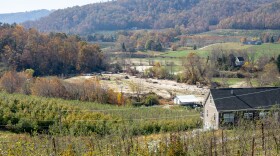Researchers at North Carolina State University and the N.C. Plant Sciences Initiative (PSI) are working to bring artificial intelligence technologies to agriculture.
AI has many potential applications in agriculture. But the industry doesn’t currently have the same resources that have enabled AI development in other fields. NC State researchers are trying to change that.
Chris Reberg-Horton, the Platform Director for the PSI at NC State, is working with his team to collect images of weeds that will be used to teach AI-powered equipment to recognize them and differentiate them from other plants.
“We have a robot set up that drives across an area that has lots of different weed species planted in pots out there,” he said. “And so, we can image, right now, about 500 pots a day through that system.”
Reberg-Horton said existing high tech agricultural equipment has the potential to observe and deliver precise care for individual plants.
“What's been missing is the knowledge and intelligence of field conditions to be able to inform that smart equipment of what to do,” he said. “And so, I really think that, you know, AI, and specifically, computer vision is one of the missing pieces in that.”
Reberg-Horton said that with the addition of AI, farming equipment could become more autonomous, including self-driving combines and tractors, or robots that could apply precise amounts of fertilizer or pesticide to crops as needed.
Advances like this could potentially make agriculture more environmentally friendly, or address labor shortages.







